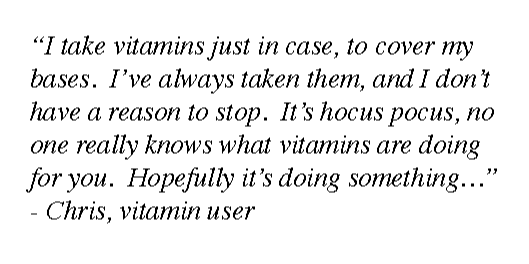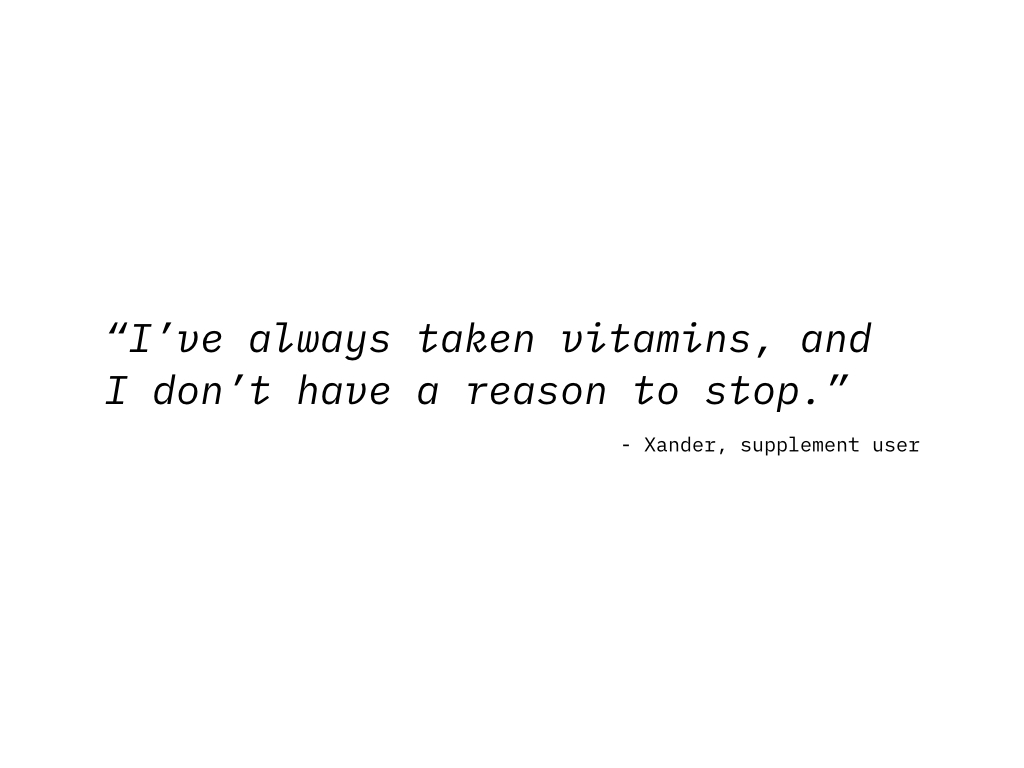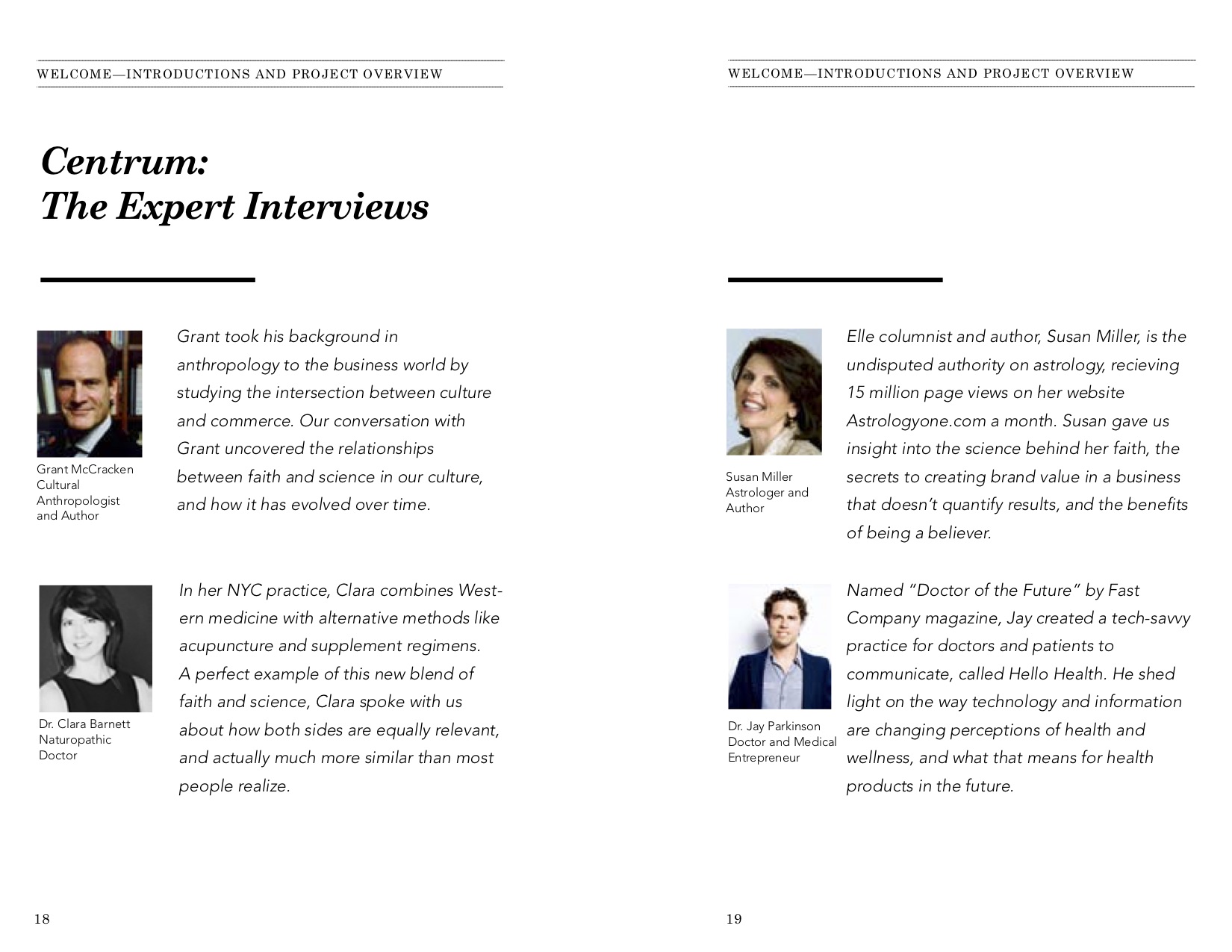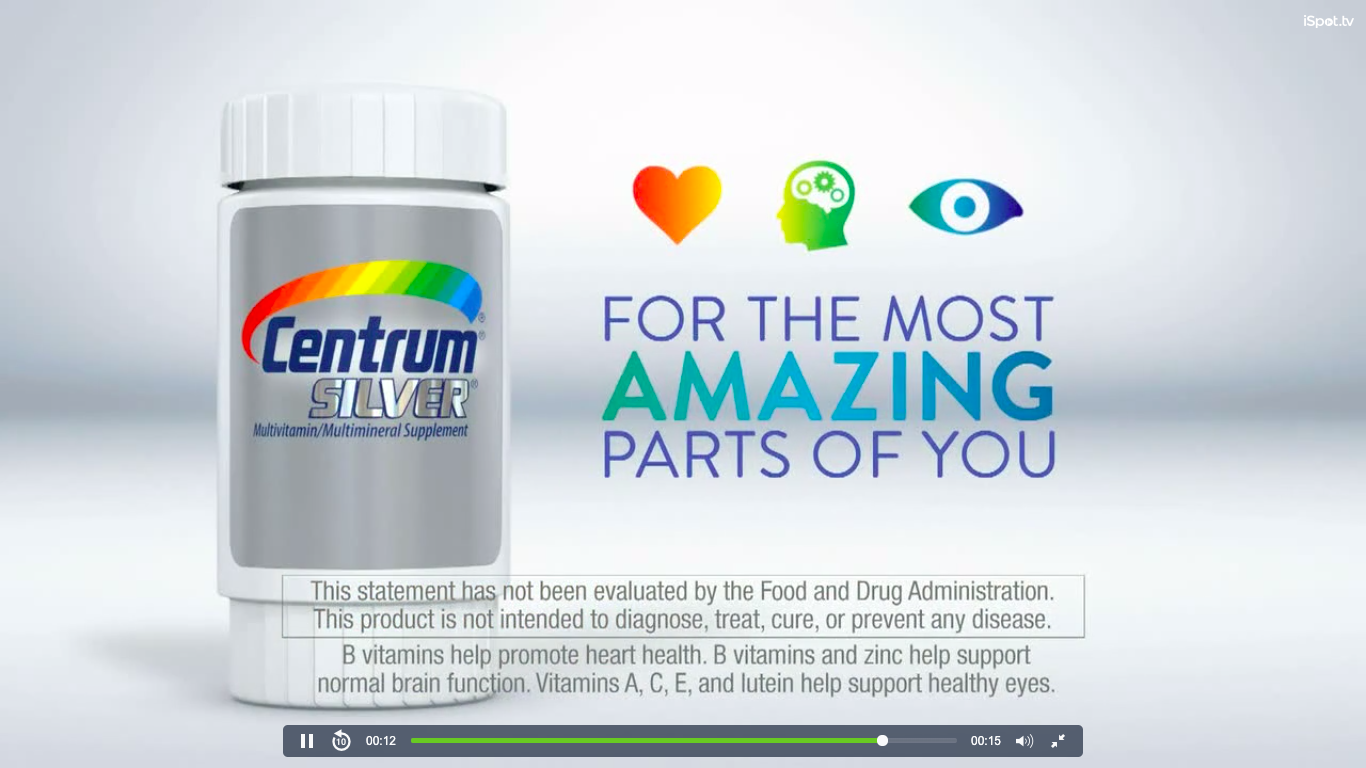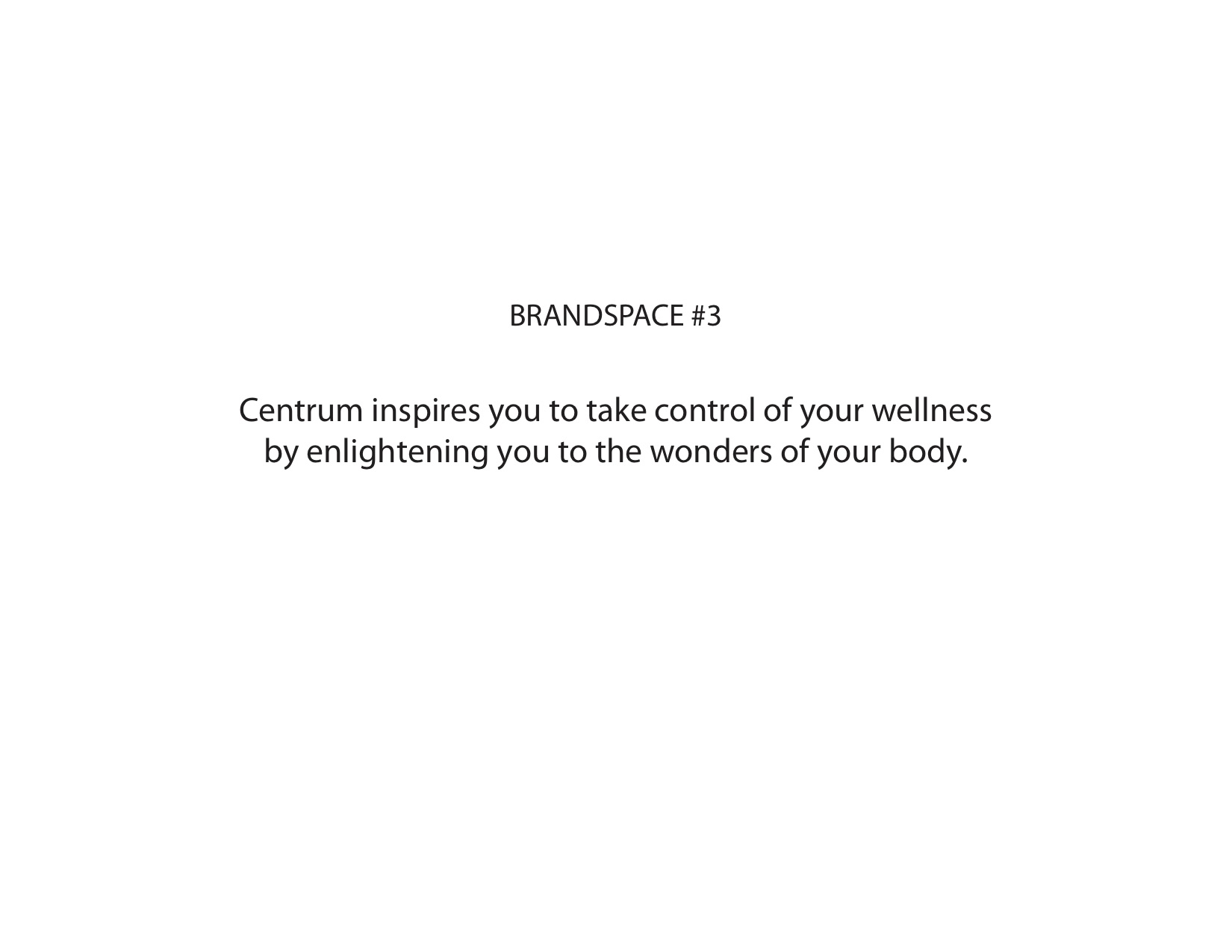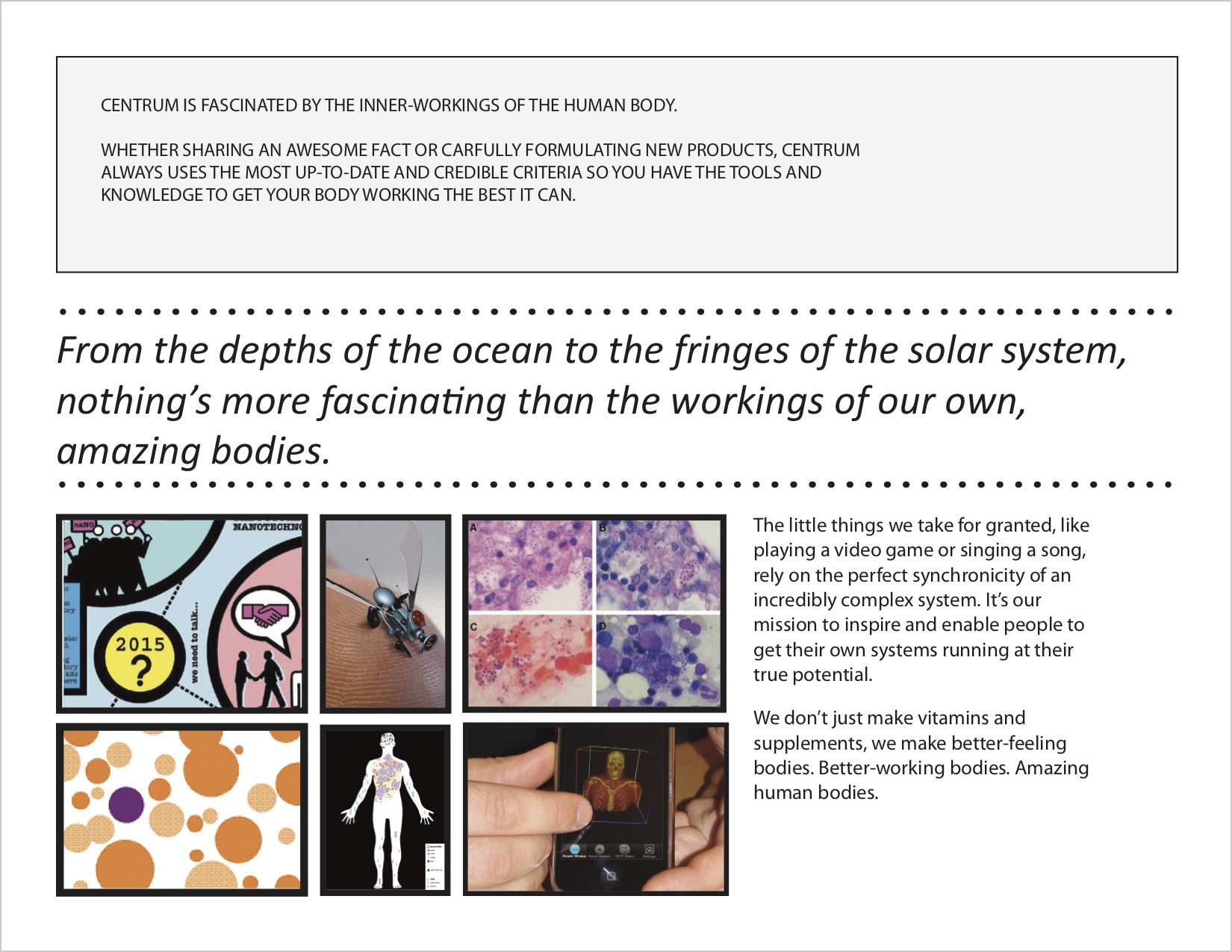CASE STUDY 2 | CREATIVE RESEARCH & CONCEPT IDEATION
CENTRUM | What do you do when you can’t prove your product works?
I. Context
I. Context
Today, 75% of Americans take dietary supplements like vitamins, minerals, herbs, and enzymes. And, along with the rest of the “wellness” industry, the category continues to grow every year. Yet, the category had become commoditized.
So, when disruptive startup brands and white labels started stealing market share from category-leader Centrum, they needed to establish a relevant point of view for this new “wellness” era (or at least a point of difference) if it was going to be able to compete.
In the past, marketers would often focus on creating a new “claim” for a quick way to boost sales for a functional product. But that wouldn’t work in this case.
First, there was a glaring lack of evidence to back a new claim. Unlike medication and prescription drugs, dietary supplements have barely been studied. Hell, they’re practically unregulated; the FDA doesn’t have to approve or inspect supplements at all. So, the supplements industry (along with other huge industries like anti-aging, finance, and—of course—religion) is faith-based. I proposed to Centrum that, instead of creating a new claim, that we examine "faith-based behavior." What could we learn from people who buy products based on the belief that they work?
Second, this was a new era for supplements—the “Wellness” era. What did “wellness” mean to the modern vitamin shopper, and what did that mean for Centrum?
My team and I spoke to people on all sides of this—evangelists, atheists, experts, customers, and stakeholders. We explored themes around illness, wellness, belief systems, aging and future planning, fear, natural medicine, habit, self-diagnosis and medication, along with the changing modes of health care in general. Some of the themes we explored:
- What does “improving health” mean to people? Is this promise even compelling enough?
- What’s with “wellness?” What’s its relationship to “health?”
- Why do people engage in long-term behavior with intangible results? And is it possible to make intangible results tangible?
- Are there other reasons people take vitamins? Are any of the reasons tied to more immediate, trackable, tangible, emotional or rational benefits?
III. What we learned
IV. The Brand Idea
So what did this mean for the brand positioning?
75% of Americans take dietary supplements and even more believe they work. As the category leader, it was Centrum's job to show what they help people do. Instead of trying to demystify how vitamins work in the body, they needed to celebrate how complex the human body is—and show them that vitamins help our amazing bodies do amazing things.
“Amazing Bodies” became the handle for our brand positioning, which was passed to JWT for an ad campaign. They created the tagline, “For the most amazing parts of you" and some cool tv spots that were a huge departure for the brand.
So, when disruptive startup brands and white labels started stealing market share from category-leader Centrum, they needed to establish a relevant point of view for this new “wellness” era (or at least a point of difference) if it was going to be able to compete.
II. Approach
In the past, marketers would often focus on creating a new “claim” for a quick way to boost sales for a functional product. But that wouldn’t work in this case.
First, there was a glaring lack of evidence to back a new claim. Unlike medication and prescription drugs, dietary supplements have barely been studied. Hell, they’re practically unregulated; the FDA doesn’t have to approve or inspect supplements at all. So, the supplements industry (along with other huge industries like anti-aging, finance, and—of course—religion) is faith-based. I proposed to Centrum that, instead of creating a new claim, that we examine "faith-based behavior." What could we learn from people who buy products based on the belief that they work?
Second, this was a new era for supplements—the “Wellness” era. What did “wellness” mean to the modern vitamin shopper, and what did that mean for Centrum?
My team and I spoke to people on all sides of this—evangelists, atheists, experts, customers, and stakeholders. We explored themes around illness, wellness, belief systems, aging and future planning, fear, natural medicine, habit, self-diagnosis and medication, along with the changing modes of health care in general. Some of the themes we explored:
- What does “improving health” mean to people? Is this promise even compelling enough?
- What’s with “wellness?” What’s its relationship to “health?”
- Why do people engage in long-term behavior with intangible results? And is it possible to make intangible results tangible?
- Are there other reasons people take vitamins? Are any of the reasons tied to more immediate, trackable, tangible, emotional or rational benefits?
III. What we learned
"Health" is quantifiable. It's black and white (you're either in the "healthy" weight, cholesterol, and blood pressure range, or you're not). Wellness, on the other hand, is a feeling. It's intangible. It's a lifestyle. Health is reactive and wellness is proactive. Health is the lack of pain and wellness is the high of endorphins. Health is necessary evils and wellness is justified luxury.
Health is the sobering limits of science and wellness is the endless possibility of science. Health is claims and wellness is faith-based behavior.
Health is the sobering limits of science and wellness is the endless possibility of science. Health is claims and wellness is faith-based behavior.
IV. The Brand Idea
So what did this mean for the brand positioning?
75% of Americans take dietary supplements and even more believe they work. As the category leader, it was Centrum's job to show what they help people do. Instead of trying to demystify how vitamins work in the body, they needed to celebrate how complex the human body is—and show them that vitamins help our amazing bodies do amazing things.
“Amazing Bodies” became the handle for our brand positioning, which was passed to JWT for an ad campaign. They created the tagline, “For the most amazing parts of you" and some cool tv spots that were a huge departure for the brand.

